Vaughan Rising Blog: How to Become a COVID-Resilient Startup
Hop In Technologies is a startup that created a logistics software platform that helps employees get to work, particularly in areas outside the metropolitan core where transit service is limited. Hop In fills the last mile gap by arranging shuttles on optimized routes.
When Ontario shut down most workplaces in mid-March, commuting plummeted. According to Statistics Canada, public transit trips fell 42% in March and 85% in April. Hop In’s model was shaken to the core. Time for a pivot!
Telling Hop In’s COVID story is Founder Erich Ko. He and his co-Founder Boyd Reid have been hustling to build the business since it launched in 2018. When the lockdown happened, Erich says they knew they needed a new game plan. But while they figured that out, they wanted to help.
Here are five strategies that Hop In found successful as a startup during a pivot
1. Make yourself useful
At the beginning of the pandemic, Erich remembers, “For the first couple of months, everybody was in triage mode, just trying to figure out how to survive and what their place is in this new pandemic world. At that point, we took a step back and asked how we could help others while we figure out our next step.”
In finding ways to make themselves useful, Hop In started offering rides to work for front-line health care workers. “We thought, do what we know. So, we started offering some free rides to work for them and eventually the community came around us and we had Captain’s Boil restaurant in Vaughan, Caterable Inc., and Meringue Kiss (a local bakery in Vaughan) help us out and donate meals. We combined delivering rides to work and meals and we ended up donating over a hundred meals over the course of two months, thanks to our partners,” says Erich.
Hop In also partnered with suppliers in their network to donate and distribute more than 20,000 disposable masks across the country.
-
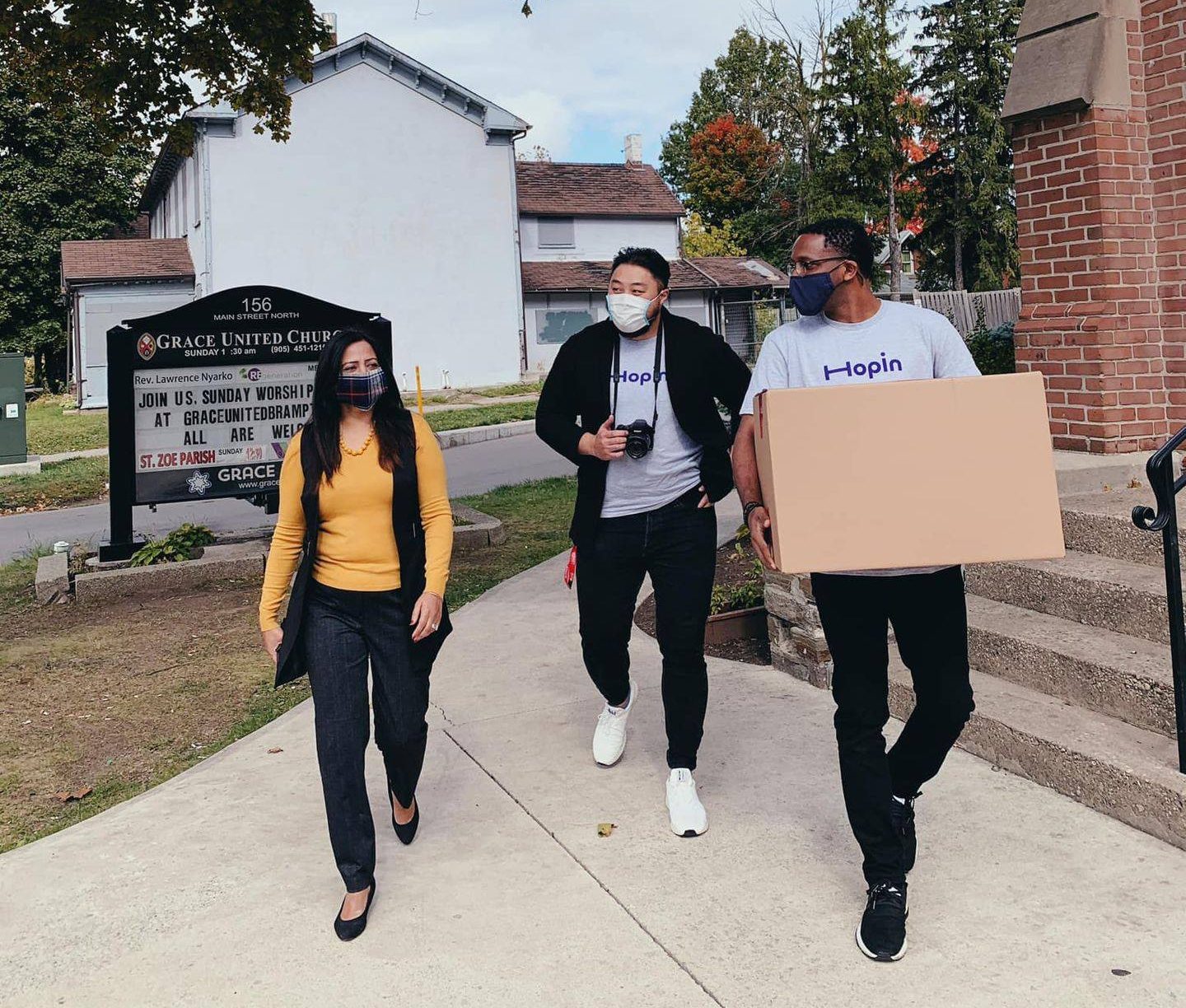
The Hop In team has worked with MP Sonia Sidhu (Brampton South) to donate PPE supplies across the GTHA.
-
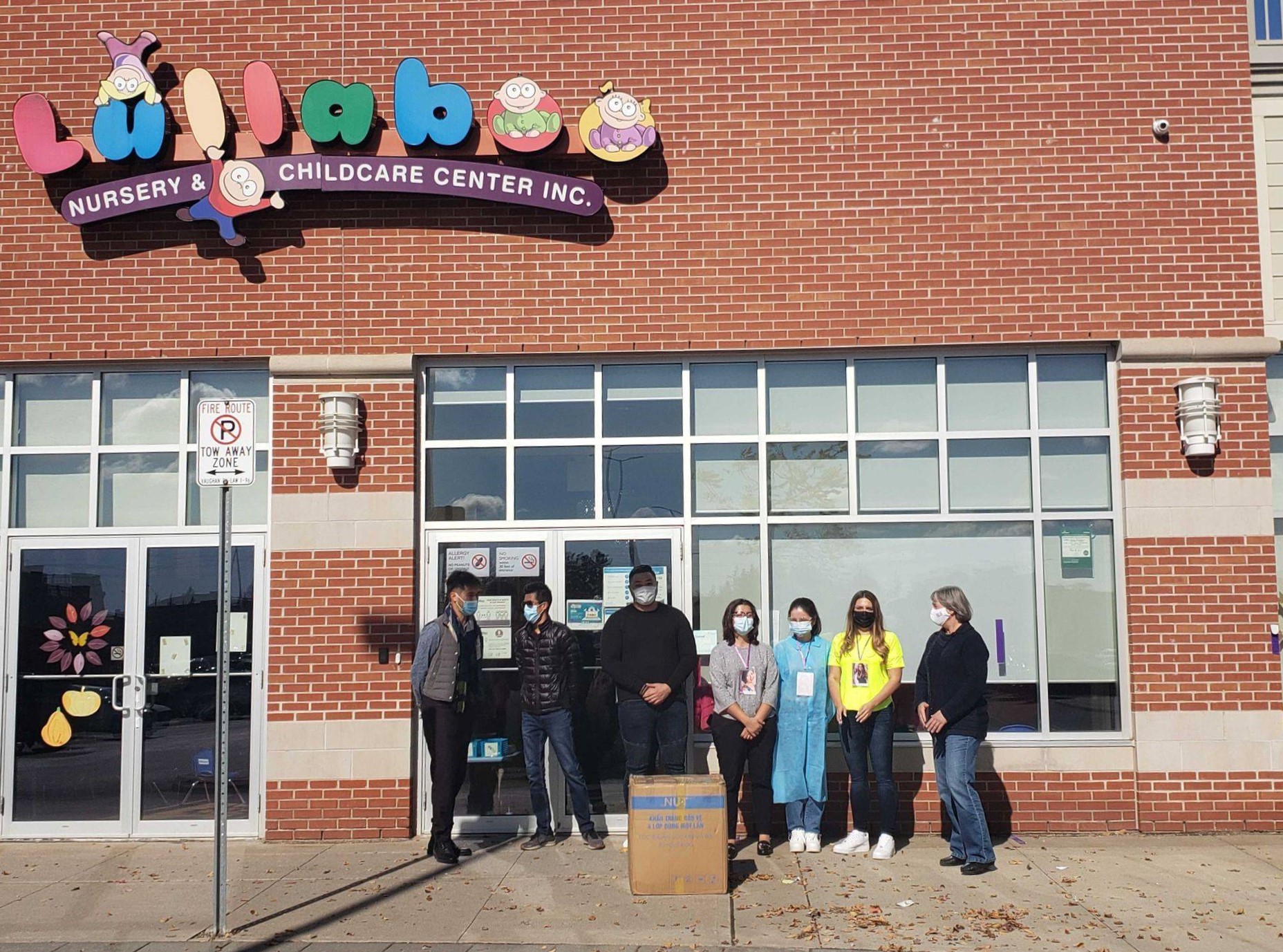
The Hop In team has also worked with Minister Deb Schulte (King-Vaughan) to donate PPE supplies across the GTHA.
-
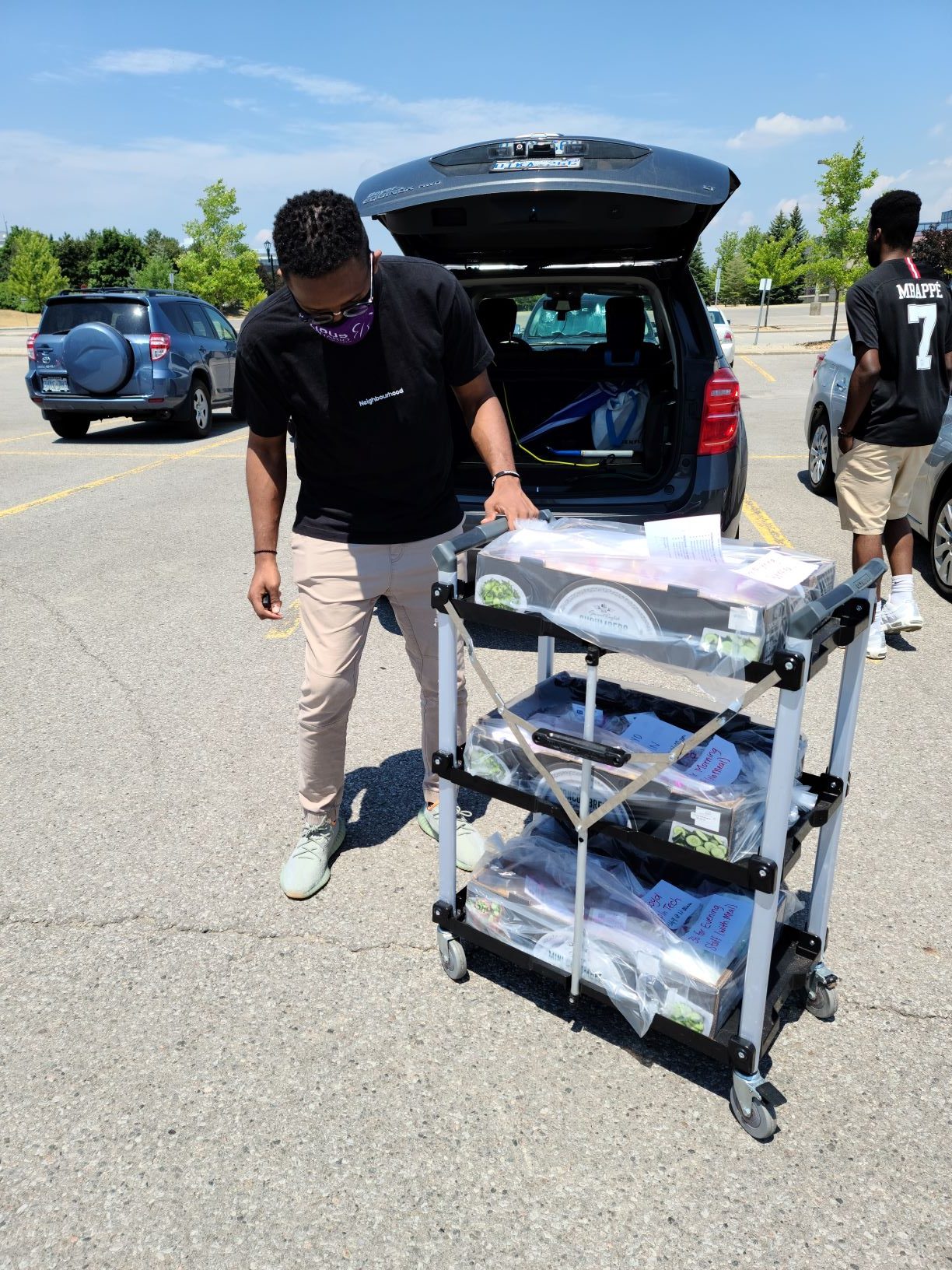
Co-Founder of Hop In, Boyd Reid, seen donating hot meals and treats to Markhaven Home for Seniors.
-
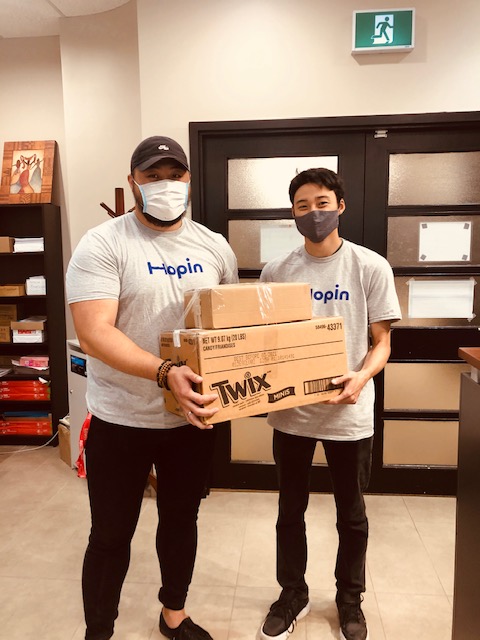
Co-Founder of Hop In, Erich Ko, seen donating masks to the North York Community House.
-
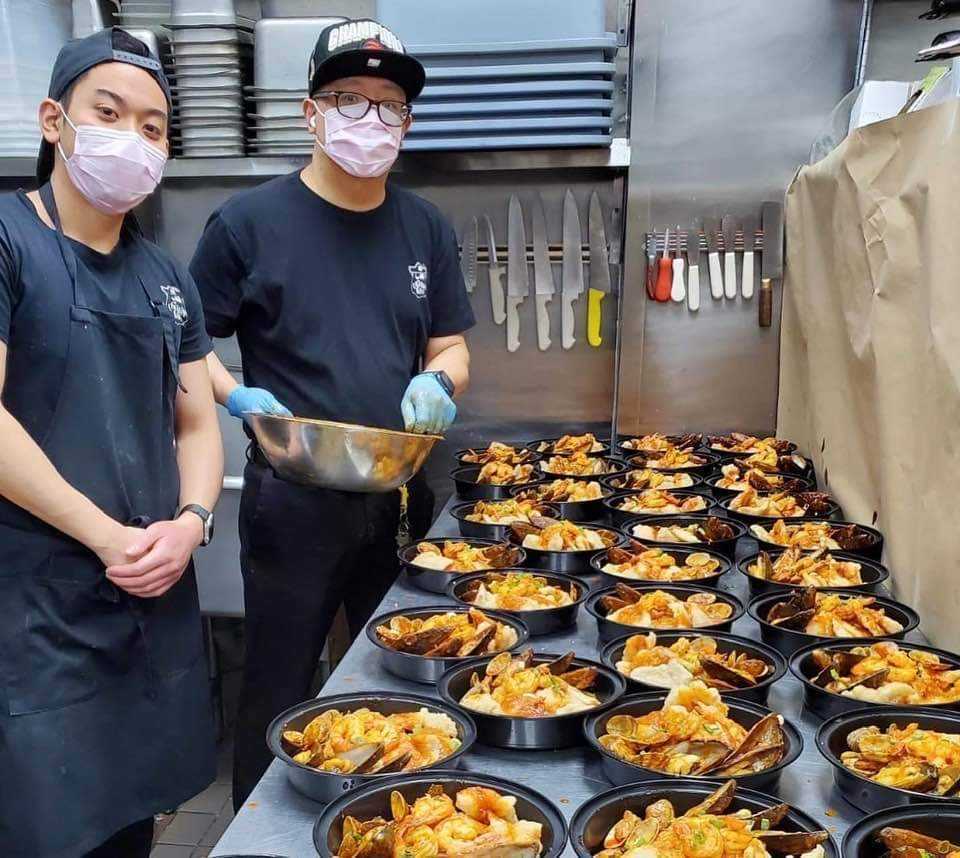
The team at Captain's Boil Vaughan preparing meals to donate to frontline healthcare workers.
-

Co-Founders of Hop In, Erich Ko & Boyd Reid.
2. Address COVID head-on
Meanwhile, Hop In was still working on their pivot plan. A new idea emerged that dovetailed nicely with their original vision for the company.
Erich admits, “If you look at a transportation company, you’d think you’re kind of dead in the water with COVID happening. But we looked at it as an opportunity to reassess and help where we can. We looked at the essential companies, like food processing or consumer packaged goods (CPG), and thought okay they have to stay in business. How can we help them?”
In order to safely serve these companies during COVID, Hop In revamped their entire sanitization policy to make it as airtight as possible.
“It starts with the bus. It’s sanitized daily – sometimes twice a day,” Erich explains. “We get video sent to us regularly by the company to show us that it’s happening. Our drivers do checks to make sure that your mask is pulled up above your nose and it’s covering your chin. We’ll supply disposable masks if we need to – if somebody doesn’t have it. We do social distancing in the buses. We have sanitizer. Taking all those precautions that we need to.”
He continues, noting that, “Hop In has just finished designing our mobile app, so there’s a ticketing system put in place. So we make sure that we can track the people coming on and off. I won’t say too much, but we’re working with another company right now to provide symptom tracking as well on the mobile app. So, we’ll be able to offer that to companies pretty soon. I’m very excited about that because we can kind of create a little NBA-style bubble for corporations if you will.”
The pivot worked and they picked up a major new client in July: Maple Lodge Farms in Brampton. The pandemic had intensified two challenges for the company and Hop In offered solutions.
Hop In conducted a survey, which included Maple Lodge Farms. The survey revealed that a lot of employees from the companies were not comfortable with public transit just yet. “We said we can help you with this,” says Erich.
At the same time, he observes, “A lot of the manufacturing companies are going through hiring phases right now. Maple Lodge is kind of falling in line with that as well, and we were able to help them expand their hiring pools through our accessibility. They actually hired their first two employees from Scarborough, which is unheard of if you’re in Brampton. So, we can definitely fill that gap as well for the time being.
3. Plan for the long term
Fundraising is such a huge part of the startup experience and can be difficult to access at the best of times. But, in this pandemic environment, Hop In finds little change in the process for raising capital.
“You hear all these horror stories about raising in a time like this, and I think a lot of the startups that raised back in the 2008 recession will tell you some of those stories. But to be honest, I haven’t found it to be too much more difficult than before.
“You know, you might have to prove out your metrics a little bit more to the investors, but at the end of the day I think they still understand when there’s a good business. We’ve been able to become COVID-resilient, I guess I’ll say, so we’re on track. We’re actually raising right now and as long as we hit our metrics, I think we’re okay and we’re good to go. Investors are still open for business and I think everybody should be approaching them,” he advises.
As for long-term growth, Erich indicates that many of Hop In’s new business strategies and pivots are here to stay, even post-vaccine.
“I think what COVID’s taught us is that we do really need to take more care in terms of things like sanitization and making sure we’re tracking symptoms, because even flu season hits everybody. So, I think we’re going to keep a lot of these measures in place, just making sure that we are being as clean and efficient as possible all the time. It’s a lifelong lesson that we’ve learned from this, definitely.”
4. Leverage your advantages
Hop In undeniably managed to find its niche in a post-COVID economy. Hop In’s early stage status, as a small startup, was a factor in their ability to pivot – a positive one.
“Definitely, but I don’t think it’s necessarily a bad thing. For startups, it’s all about perspective and how you solve the problem in different ways,” Erich shares. “We looked at it that we’re a small lean team and we can move very quickly, so we pivoted towards a COVID-safe model very quickly and leveraged the different initiatives that we had. We don’t have 50 – 100 employees. We didn’t have to worry about moving everyone together that way. We were able to move very quickly, and I think that’s why we’re coming out of this pandemic stronger than we actually entered it.”
5. Leverage your network
Ask for help from your connections, whether that is other colleagues in your network, economic development organizations, business coaches, or your own team members.
Erich has this advice for other startups, “Hang in there. It’s a perspective thing. A lot of startups have gone down or might see themselves going down during the pandemic. But there’s always a pivot to be made, I think, and it’s all about how you look at it. There’s always that silver lining, because I think as startups, we’re always kind of fighting an uphill battle. But there’s a way to get to the end.
“One way is to reach out to your network. They can help you pivot a lot, like the team at the Vaughan economic development department helped us a lot through the pandemic. The community really came around and helped us out with our initiatives through the worst parts of this and we can only go up from here. So I’m excited to see what happens.”
Erich couldn’t say too much, but their plans for the near future include raising money to complete new tech advancements and grow the team. To house the bigger team, they’re hoping to deepen their roots in York Region with their first office space. Then, when the borders open, they hope to expand outside of Canada.
Hop In Technologies is a great example of a Vaughan startup that has pivoted their mindset, leveraged their resources, and found the silver lining to keep rising and come out stronger on the other side.
The information presented in this article is provided solely for the purpose of bringing ideas to the attention of the business community, as a service to the businesses of the City of Vaughan.
The City of Vaughan does not, whether directly or indirectly, endorse, sponsor or sanction the opinions expressed in this article, nor any services or products that may be offered by the contributor/s in their normal course of business. The City of Vaughan does not intend by this article to recommend the contributor/s nor to promote them as subject matter experts over any other business persons employed or engaged in similar lines of business.
